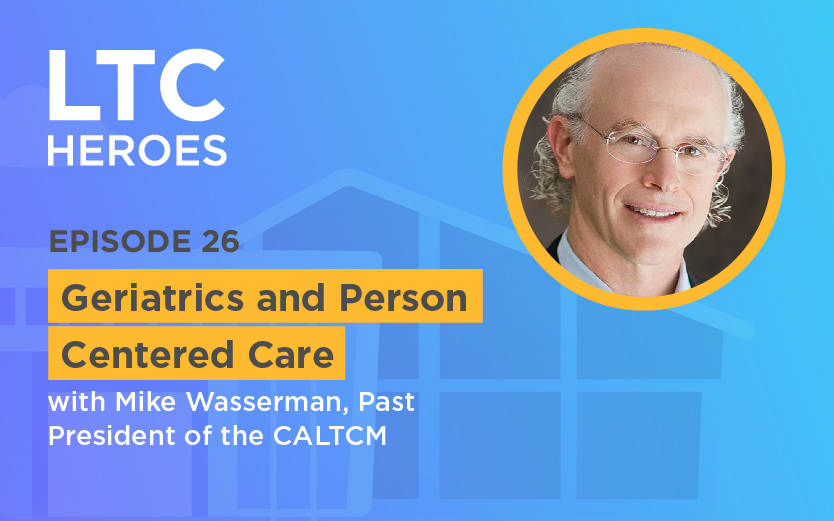On this episode of the LTC Heroes podcast, Mike Wasserman, Past President of the California Association of LTC Medicine, joins us to share his insights on leadership and person centered care in the field of geriatrics.
The Field of Geriatrics
Mike explains that the difference between the geriatric approach to care and traditional primary care is that geriatrics focuses on the function and quality of life for patients rather than diagnosis, treatment, and cures. Taking a person centered approach to care, geriatrics is about truly getting to know a person in order to figure out what matters most to them with the time they have left.
Mike touches on the unfortunate fact that the number of geriatricians has dropped about 50% over the past 20-30 years. The reasons for this decline include lower pay for geriatricians, poor reimbursement rates for geriatric care, and medical students not being given quality exposure to the field while in medical school.
Leadership Training
Regarding leadership in LTC, Mike says oftentimes when physicians are put in leadership positions, they haven’t had the training or don’t understand how to be effective leaders. This is the product of health systems being stuck in dated approaches to how leaders are developed.
He also discusses the issue of non-clinically trained administrators not understanding the consequences of their choices and how it relates to the overall health of residents. Mike says clinical leaders and financial leaders need to have an equal voice within their organizations to truly improve outcomes.
Learn more and sign up to be notified about future episodes at LTCHeroes.com
Rapid Fire Q/A
What actionable advice will we talk about in today’s podcast?
I am a huge believer that we have to focus on improving leadership and management training in nursing homes in particular. You cannot expect a nursing home administrator to run what is essentially a mini-hospital. So that’s sort of my favorite topic, my number one focus. And I think if the industry and the government don’t go in that direction, we will never fix long term care.
What is a lesser known resource you recommend we turn to in order for us to gain a better understanding of LTC and leadership?
I personally only use Twitter for geriatrics, LTC, and the field of aging. And so actually, if you follow me on Twitter, you’re going to get the people I follow who are other geriatricians and gerontologist experts. For example, Dr. John Morley is one of my mentors, he’s always tweeting great information about long term care medicine. And there are a number of other folks.
Do you have a mentor that has impacted the way you approach LTC?
I have a lot of mentors. I love mentoring people. But when I look at my whole career, the mentor who stands out is Ray. He worked for me back in the 90s. He ultimately became my patient and my best friend and he passed away a few years ago. But he taught me much about business and interacting with people that has had a profound impact. He always said to me, “Mike, the truth is always in the middle.” And that sounds very simple. I have lived by that concept, and it often allows me to avoid the extremes at times and really hone in on getting to the bottom of things.
What advice would you give to your younger self?
The thing I’ve learned is I’m a very passionate person. And my passion and my transparency combined is an incredibly effective way of communicating. But that passion can come across too strong sometimes. And I think I’ve learned how to modulate the passion to more effectively make my case. I think that’s the one lesson I would tell my younger self is to modulate your passion a little more so that people will actually pay a little more attention to you.

